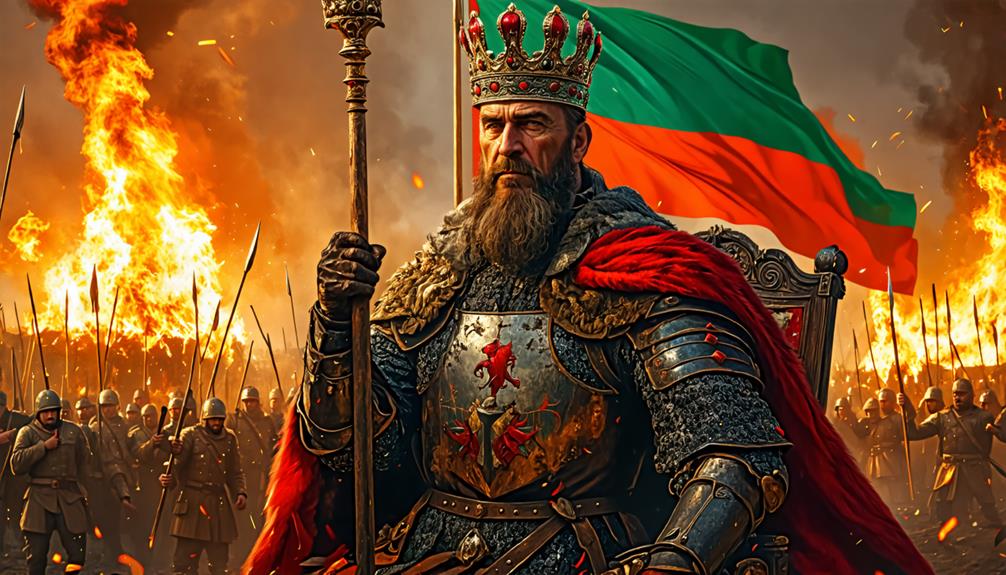Ivan the Terrible, one of Russia's most notorious rulers, had ambitious plans for expansion.
But what if he had successfully conquered Lithuania during his reign?
This alternate history scenario would have dramatically reshaped Eastern Europe's geopolitical landscape.
Russia's power and influence would have soared, altering the course of European diplomacy for generations to come.
Expansion of Russian Territory

If Ivan the Terrible had conquered Lithuania, it would have significantly expanded Russia's territory and influence in Eastern Europe.
One theory is that Russia's borders would have extended further west, encompassing present-day Lithuania, Latvia, and parts of Poland, which could have strengthened Russia's position as a major power by providing access to the Baltic Sea and new resources.
It's possible that this territorial expansion would have markedly altered the region's geopolitical landscape.
Interestingly, while Ivan the Terrible didn't conquer Lithuania, the Russian Empire did end up absorbing most of the former Grand Duchy of Lithuania in the late 18th century during the partitions of the Polish-Lithuanian Commonwealth.
Shift in European Power Dynamics
If Ivan the Terrible had successfully conquered Lithuania, it could have significantly altered the balance of power in Europe. One theory is that Russia's increased territory and resources would have made it a dominant force, potentially overshadowing the influence of Poland-Lithuania and deterring Ottoman expansion.
These changes might've led to a dramatic reshaping of European geopolitics and alliances.
It's worth noting that while Ivan the Terrible didn't achieve this conquest, the Russian Empire later annexed much of Lithuania during the late 18th century partitions of the Polish-Lithuanian Commonwealth.
Religious and Cultural Upheaval

In an alternate timeline where Ivan the Terrible conquered Lithuania, it's possible that significant religious and cultural upheaval would have occurred in the region. One theory suggests that the Russian Orthodox Church might've forcefully displaced Catholicism, while Ivan suppressed Lithuanian language and traditions, imposing Russian culture instead.
The distinct Lithuanian identity could have been under grave threat, leading to profound changes in the sociocultural landscape of Lithuania and surrounding areas.
It's worth noting that while this particular scenario didn't happen under Ivan the Terrible, the Russian Empire did later absorb most of the former Grand Duchy of Lithuania during the late 18th-century Partitions of Poland.
Economic Impact on Trade Routes
If Ivan the Terrible had conquered Lithuania in the 16th century, it may have disrupted key East-West trade routes and shifted economic power in the region.
One theory is that Russian control over valuable Baltic Sea ports would have increased, potentially leading to new taxes and restrictions on overland trade between Europe and Asia via Lithuania.
Vilnius' role as a commercial hub could have diminished under Ivan's rule, favoring Russian merchants instead.
While Ivan didn't conquer Lithuania, the Polish-Lithuanian Commonwealth was later partitioned by Russia, Prussia, and Austria in the late 18th century.
This led to similar changes in trade routes and economic power dynamics in the region, with Russia gaining control over much of Lithuania's territory.
Altered Alliances and Diplomacy

While Ivan the Terrible never conquered Lithuania, an expansionist Russia in the 16th century could have dramatically altered European geopolitics.
One theory is that nearby kingdoms like Poland and Sweden would have been compelled to forge new alliances to counter this threat, potentially realigning the balance of power in the region.
It's possible such a conquest, had it occurred, may have spurred the Polish-Lithuanian Commonwealth to more aggressively confront Russia in subsequent decades.
Interestingly, Russia did eventually partition and annex much of the Polish-Lithuanian Commonwealth in the late 18th century under Catherine the Great, over 200 years after Ivan the Terrible's reign.
Lasting Legacy on Lithuanian Identity
If Lithuania had fallen under Ivan the Terrible's rule in the 16th century, it could have led to significant changes in Lithuanian identity and culture over time.
One theory is that the Lithuanian language and traditions would have been suppressed and gradually replaced by Russian cultural influences, resulting in a Lithuanian identity more closely tied to Russia.
It's also possible that if this scenario occurred at a later date under a different Russian ruler, the cultural impact may have been less severe or taken a different form.
Ultimately, it's difficult to say exactly how Lithuanian identity would have evolved, but it likely would have been shaped by centuries of Russian dominance and assimilation policies.
Conclusion
Imagine if you were there when Ivan's armies triumphed over Lithuania. As luck would have it, you'd witness a defining moment that'd reshape Europe's destiny.
Russia's influence would've surged as Orthodoxy replaced Lithuanian traditions. Trade routes would've shifted, while new alliances formed.
It's a twist of fate that could've altered Lithuania's identity forever. In this alternate reality, the repercussions of Ivan's conquest would still be felt today, centuries later.

Leave a Reply